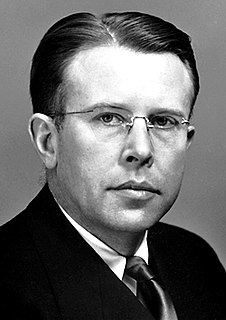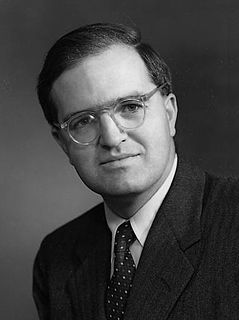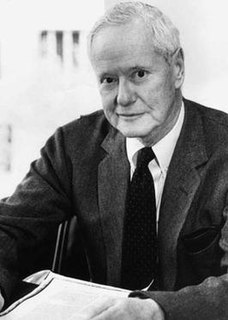A Quote by Irving Langmuir
Only a small part of scientific progress has resulted from planned search for specific objectives. A much more important part has been made possible by the freedom of the individual to follow his own curiosity.
Related Quotes
When the mathematician says that such and such a proposition is true of one thing, it may be interesting, and it is surely safe. But when he tries to extend his proposition to everything, though it is much more interesting, it is also much more dangerous. In the transition from one to all, from the specific to the general, mathematics has made its greatest progress, and suffered its most serious setbacks, of which the logical paradoxes constitute the most important part. For, if mathematics is to advance securely and confidently, it must first set its affairs in order at home.
Try to find your individuality, your integrity, and make the effort of not compromising. Because the more you compromise, the less you are an individual. You are only a cog in the wheel, just a part in the vast mechanism, just a small part of the mob - not an individual in your own beauty, in your own right. I am absolutely against compromise. Death is far more beautiful than a life of compromise.
There is no "scientific worldview" just as there is no uniform enterprise "science" - except in the minds of metaphysicians, school masters, and scientists blinded by the achievements of their own particular niche... There is no objective principle that could direct us away from the supermarket "religion" or the supermarket "art" toward the more modern, and much more expensive supermarket "science." Besides, the search for such guidance would be in conflict with the idea of individual responsibility which allegedly is an important ingredient of a "rational" or scientific age.
When we are on the beach we only see a small part of the ocean. However, we know that there is much more beyond the horizon. We only see a small part of God's great love, a few jewels of His great riches, but we know that there is much more beyond the horizon. The best is yet to come, when we see Jesus face-to-face.
The search for the lessons of the new science is still in progress, really in its infancy. In this realm, three is a new kind of freedom, where it is more rewarding to explore than to reach conclusions, more satisfying to wonder than to know, and more exciting to search than to stay put. Curiosity, not certainty, becomes the saving grace.
I am mindful that scientific achievement is rooted in the past, is cultivated to full stature by many contemporaries and flourishes only in favorable environment. No individual is alone responsible for a single stepping stone along the path of progress, and where the path is smooth progress is most rapid. In my own work this has been particularly true.
Both for my wife and myself, the personal friendships that have grown out of scientific contacts with colleagues from many different countries have been an important part of our lives, and the travels we have made together in connection with the world-wide scientific co-operation have given us rich treasures of experiences.
Only when he has published his ideas and findings has the scientist made his contribution, and only when he has thus made it part of the public domain of scholarship can he truly lay claim to it as his own. For his claim resides only in the recognition accorded by peers in the social system of science through reference to his work.
As the years progress, what women and men will discover is that the most lasting and rewarding educational experiences come not from specific information provided in classroom lectures or assigned textbooks, but from the values obtained in active engagement in meaningful issues. We achieve for ourselves only as we appreciate the problems and concerns of others-and only as we see our own lives as part of a much greater social purpose.
Always mystify, mislead, and surprise the enemy, if possible; and when you strike and overcome him, never let up in the pursuit so long as your men have strength to follow; for an army routed, if hotly pursued, becomes panic-stricken, and can then be destroyed by half their number. The other rule is, never fight against heavy odds, if by any possible maneuvering you can hurl your own force on only a part, and that the weakest part, of your enemy and crush it. Such tactics will win every time, and a small army may thus destroy a large one in detail, and repeated victory will make it invincible.
Science fiction has its own history, its own legacy of what's been done, what's been superseded, what's so much part of the furniture it's practically part of the fabric now, what's become no more than a joke... and so on. It's just plain foolish, as well as comically arrogant, to ignore all this, to fail to do the most basic research.





































